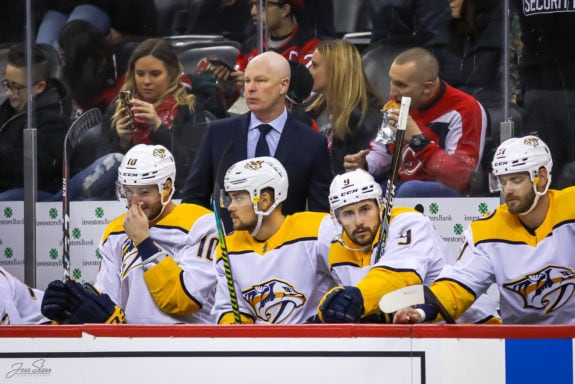It’s fair to say that one of the reasons the Nashville Predators finished sixth in the Western Conference and were eliminated by the Arizona Coyotes in the Qualifying Round of the 2020 NHL Playoffs was their ineffective special teams. Their power play was stagnant, ranked 25th in the NHL, while the penalty kill was even worse at 29th. You don’t need to be an expert to know that you won’t win a championship without your special teams performing strongly.
General manager David Poile and head coach John Hynes have addressed this problem with some of the acquisitions they’ve made this offseason in preparation for the 2020-21 season. Through coaching additions and free agent signings the Predators – on paper – have improved their special teams.
Offseason Coaching Additions
Hynes came to Nashville midway through last season after being fired by the New Jersey Devils. In his four full seasons with the Devils, they finished in the top ten in league penalty-killing three times. Hynes has a feel for defensive play, and a big part of the Predators’ mission in decreasing the goals-per-game average will be improving their penalty kill.

On Sept. 10, Dan Hinote was added to the coaching staff, bringing his high penalty-killing IQ to Nashville. During his playing career, Hinote won a Stanley Cup on a very good Colorado Avalanche team. In 2001, he played an important penalty-killing role in the Cup Final against the Devils, who boasted the league’s top power play, and held them to a 9% success rate in the seven-game series.
The other key coaching addition is also a Stanley Cup-winner, and a much more recent one. Todd Richards joined the Predators on Oct. 23 after running the power play for the Stanley Cup-champion Tampa Bay Lightning for the past four seasons. In his time in that role, the Lightning never finished worse than sixth in the league in power-play percentage and finished with the best power play in the 2018-19 season. Richards also has extensive head coaching experience with the Minnesota Wild and the Columbus Blue Jackets, posting a career record of 204-176-37 with the two clubs.
Power Play Additions
The addition of Richards should energize the top power-play unit, which on paper should stack up with any other top unit in the NHL. However, Richards’ toughest task will be creating a solid second unit; after the top four forwards, the scoring talent isn’t quite there. A new face with new ideas, coupled with perhaps another big free-agent signing, could be the solution the Predators are looking for.
Roman Josi and Ryan Ellis will likely continue to anchor the blue line on the power play and having Matt Duchene and Ryan Johansen as the two likely power-play centres will allow for a scoring presence on the second unit. Calle Jarnkrok had nine power-play points last season, the same as Johansen and Ellis, both of whom should hope to see that number go up drastically in 2020-21.
For now, at least, the other winger position on the second unit should be a rotational spot, with players like Rocco Grimaldi, Nick Cousins and Colton Sissons seeing some time; and Luke Kunin taking some shifts there as well. Kunin, almost 23 years old, broke out with 15 goals and 16 assists on an aging and defensive-minded Wild squad last season and could be a nice addition to the Predators’ power play.

If the Predators make another splash in free agency, signing either Mike Hoffman or Anthony Duclair for example, it goes without saying that their top-six forward depth and second power-play unit would benefit from that instant scoring touch.
Richards has not been opposed to using forwards on the point on the man advantage, as Nikita Kucherov and Steven Stamkos both saw extended time playing there while he was running the Lightning’s power play. If another free-agent scorer is added, look for the Predators to use this strategy, and use Josi and Ellis separately on the two units to better distribute their offensive talent.
Penalty Kill Additions
The penalty kill is in good hands from a coaching standpoint with both Hinote and Hynes presumably having a say in the strategic and systematic side of it. But some key free-agent additions are likely to play a central role in improving the penalty kill.
Brad Richardson will likely become an impact player upfront on the penalty kill, as he has been with other clubs in the last few seasons. The 35-year old scored three shorthanded goals in 2018-19 in Arizona and helped the Coyotes to a top-five penalty kill in each of the past two seasons.
On the blue line, which is unquestionably stacked offensively, watch for Mark Borowiecki to be the go-to penalty-killing defenceman. The 31-year old former Ottawa Senator has developed into one of the better shut-down defencemen in the league over his career, and while he’ll probably never have a shift on the power play he can offset that by chewing up lots of minutes on the penalty kill.
Borowiecki is a force against opposing forwards attempting to cross the blue line or create a net-front presence. His shot-blocking ability and willingness to lay his body on the line will hopefully mean fewer shot-blocking attempts by the Predators’ stars like Josi and Ellis, who dictate so much of the team’s offence. And let’s not forget how tough and durable Borowiecki is, proven in the 2015 Playoffs:
The newly signed Cousins and Matthew Benning could also provide valuable roles on the penalty kill. Benning, a 6-foot-1 blueliner, could take some additional penalty-killing pressure off of Josi and Ellis, while Cousins should fit comfortably into a second or third unit penalty kill with someone like Sissons or Jarnkrok.
Special teams are key to any team’s success; the last three Stanley Cup champions have been in the top half of the league in both power play and penalty kill percentages. Based on the offseason the Predators have had, fans should expect a big improvement in both categories in 2020-21.